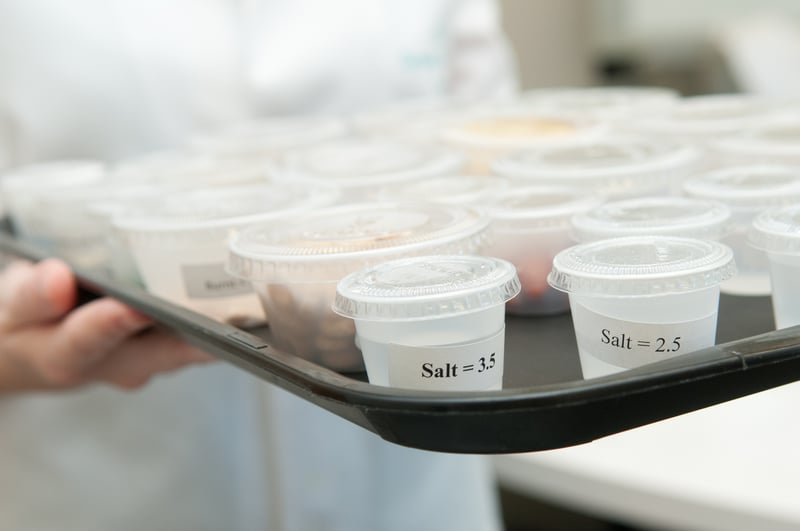
When you go into a grocery store, you make a lot of different choices when you’re deciding what to buy. In fact, you make so many different decisions that you might not realize exactly how you ended up buying a box of chocolate cookies rather than a package of crackers, but the development team behind your favorite products knows.
Martin J. Talavera, Ph.D., associate professor of sensory analysis and consumer behavior, leads the Sensory and Consumer Research Center at K-State Olathe. Talavera conducts sensory analysis research while guiding graduate students who are preparing for their own careers.
We sat down with Talavera to talk about some of the benefits graduate students can expect while studying at K-State Olathe — and how the hands-on experience they’ll get in the lab can ensure they’re prepared for their future careers.
What drew you to sensory analysis and human behavior?
My training is in food engineering. I hold a bachelor’s degree in agro-industrial engineering from Universidad San Ignacio de Loyola in Lima, Peru. Toward the end of my degree program, I started getting interested in food science, with sensory analysis being part of it. During my work on my bachelor’s thesis, I got to start working in the labs with things like enzymes, starch and fruits, but I was less experienced in that sort of thing. I also had the opportunity to go to Texas A&M University for six weeks to visit the Plant Bioactives Research Lab run by Dr. Luis Cisneros-Zevallos. That helped me decide that food science is what I wanted to do. After that, during a conference in Lima, a K-State Professor, Dr. Daniel Fung, talked about the food science program at K-State. I decided to apply and was later admitted as a graduate student in the sensory program working under the guidance of Dr. Delores Chambers.
How does our sensory analysis center help prepare graduate students for their future careers?
The Sensory and Consumer Research Center is an interesting combination of seasoned professionals conducting sensory and consumer research and graduate students training in sensory science. We manage advanced industry research while exposing our students to the industry and hands-on training. The sensory center is an integral part of sensory training for our graduate students.
We have a database of about 9,000 people in the Kansas City area, so when a client comes in and says, “I make chips and I want a hundred consumers to taste my product and evaluate crispiness, saltiness and texture,” we can make that happen.
Our graduate students have a research assistantship through the center. They work in collaboration with professional staff to support test execution, as well as analyzing and organizing reports.
Our graduate program has a reputation of producing well prepared students who can hit the ground running. Our students are also required to complete an internship before they can graduate because that hands-on experience in conjunction with their education is paramount. Students learn how to be flexible and how to solve problems in various situations. In a classroom, you have an ideal scenario that you’re taught and an exact method you can use, but then you enter a business environment that tells you we don’t have that much time, money or resources, so what do you do?
This is one of the cool things about sensory science: it’s not one method. It’s a toolbox of various approaches where you can select the best route depending on what is your objective. Our key goal is to understand the product and to understand the consumer so that we can solve problems effectively.
What are some of the hands-on things that graduate students do?
Students do a lot! They support the execution of projects and make sure that the materials are there, the iPads are charged and that those little important details are all taken care of. They work with professional staff during the studies, as well as working on the statistical analysis of reports on the backend.
Our students have their own projects, too. Some past projects they have worked on include potatoes, gluten-free crackers, hand creams, and even fragrances. Not everything our students do is food related. Students who work with the sensory center have various potential projects they can explore.
What kind of students should pursue a career in sensory analysis and human behavior?
A: Students that are interested in research and research methods. We have had many students who are interested in food science that choose to pursue sensory, but in the end, it can be anyone. Anybody who has some kind of interaction with sensory or is interested in sensory research. Our students learn about application of the sensory toolbox, but there’s not a specific background that’s required for this program. Anyone who has a curiosity about research and who wants to make a difference as a member of the research and development community can benefit from studying sensory science at K-State Olathe.
Martin J. Talavera, Ph.D., is an associate professor of sensory analysis and consumer behavior in the department of food, nutrition, dietetics and health at K-State. You can learn more about him on our website.
Participate in a sensory study
Do you like trying new things and sharing your thoughts? We are always seeking consumers interested in sharing their honest opinions about food or products. We'd love for you to join us.
%20(2).png?length=600&name=Student%20Success%20Coaches%20(Blog%20Banner)%20(2).png)

